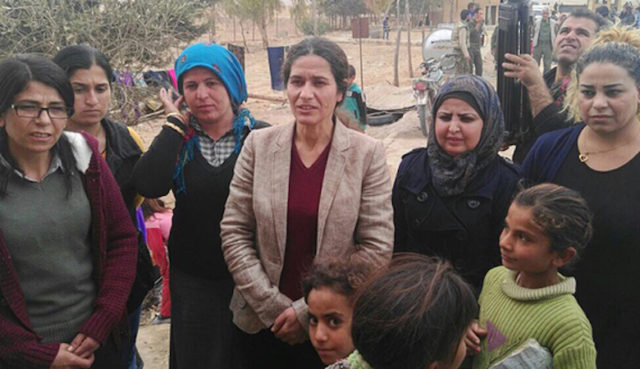
The Syria that emerges after civil war should be a federal state not based on ethnic or religious differences. So said Ilham Ehmed, co-president of the Syrian Democratic Council, in a late January meeting at the Jewish Policy Center.
The SDC, predominantly Kurdish, controls a region of northern Syria with a population of roughly 4 million, comprising 3.5 million Kurds and 500,000 others, mostly Sunni Arabs and including Iraqi refugees. Ms. Ehmed said the coalition fields approximately 50,000 fighters.
With the capture of the rebel-held half of Aleppo by forces aligned with Syrian dictator Bashar al-Assad and supported by Russia and Iran in January, momentum in the fighting appears to favor the regime. Upheaval that began with anti-Assad “Arab Spring” protests in 2011 reportedly has led to the displacement of half of Syria’s pre-war population of 22 million—four million as external refugees, seven million internal migrants. Another 400,000 to 500,000, mostly non-combatants, are believed to have been killed.
Ms. Ehmed, speaking through an interpreter—Mehmet Yuksel, U.S. representative of the Turkish Peoples’ Democratic Party (HDP, Kurdish)—said her council envisions a post-war Syria of three federated geographic and culturally-based regions. A new congress in a federated Syria would include all parties, she added.
Languages used in the SDC-controlled area include Kurdish, Arabic and Syriac, Ms. Ehmed noted.
The SDC area hosts three U.S. bases. It relations with the United States are mainly military, with commandoes and Special Forces. However, Ms. Ehmed said American support is not at the level needed to fight the Islamic State in Syria and Iraq (ISIS). Weapons provided by the Obama administration to the Free Syrian Army went to groups aligned with al-Qaeda, she charged. Ms. Ehmed said the FSA no longer exists as a fighting force.
Meanwhile, some U.S.-trained groups fought Kurdish forces, she asserted. The SDC wants continuing and increased American support to help keep al-Qaeda and ISIS out of its area.
The council proposes to take over the entire northern Syrian-Turkish border region. Ms. Ehmed said doing so would close ISIS access from Turkey to Syria and allow ISIS groups inside Syria to be eliminated easily.
However, the SDC is concerned Turkey now works with militia connected to al-Qaeda and uses ISIS as an excuse to attack Kurds.
The council believes Turkey seeks to deny it any political or military gains. In reaction, SDC will not accept any political solution or long-term ceasefire arranged without it. It fears Turkey will advocate “safe zones” for Syrian refugees so Sunni Arabs can be relocated to Syria’s Kurdish region, diminishing Kurdish cultural homogeneity.
The council suspects Masoud Barzani, president of the Iraqi Kurdistan region and head of the Iraqi Kurdish Democratic Party, “has his own agenda.” This includes imposing Iraqi Kurdish models on Syrian Kurdish territory. But doing so might fuel intra-Kurdish conflict, Ms. Ehmed said. Meanwhile, the part of the northern Iraqi-Syrian border controlled by Barzani’s forces is closed to Syria.
According to the SDC co-president, the council is not trying to expand area it controls to include Syrian Sunni Arab-majority regions within Kurdish territory. Rather, Sunni Arab-majority regions would govern themselves with Kurdish forces acting as “overall protectors” to block outside infiltration.
Ms. Ehmed said the SDC talks with Russia, and that Moscow seeks a political solution, but will continue supporting the Assad regime. Backing the Syrian ruler is the only thing Russia and Iran agree on, she added. Iran, with “boots on the ground” in Syria, has prevented Russia from starting political talks between the Kurds, including SDC, and Damascus. She rated Tehran more influential in Syria than Russia.
Iran pursues demographic change in Syria, Ms. Ehmed charged. It brings in Shia Muslims and pushes Sunnis into Kurdish areas. Turkish trainers of anti-Assad forces stress radical Islam as the main point of their ideological instruction, she added.
Friends of the SDC have spoken with members of the U.S. Congress, including Sen. Chris Van Hollen (D-MD) and Reps. Dana Rorhbacher (R-CA) and House Foreign Affairs Committee chair Ed Royce (R-CA) Ms. Ahmed also noted that Secretary of State-designate Rex Tillerson, former head of Exxon/Mobil, helped Iraqi Kurds develop oil resources in their region and become financially independent. Ms. Ehmed said Secretary of Defense James Mattis also has worked in the region and recognizes non-state actors (such as the SDC) could help with post-combat stabilization.
She said Raqqa, the Syrian “capital” of ISIS, “is going to be liberated.” The population there then will have to decide if the city should be included in the Kurdish portion of northern Syria.
Ms. Ehmed said, without details, that the SDC has “some relations with Israel.”
She is co-president in part because the council promotes women’s equality and provides for male-and-female pairs in many of its top offices. The SDC seeks to change the social contract, institutionalizing civil marriage and female equality. It also operates “women’s houses” or shelters.

